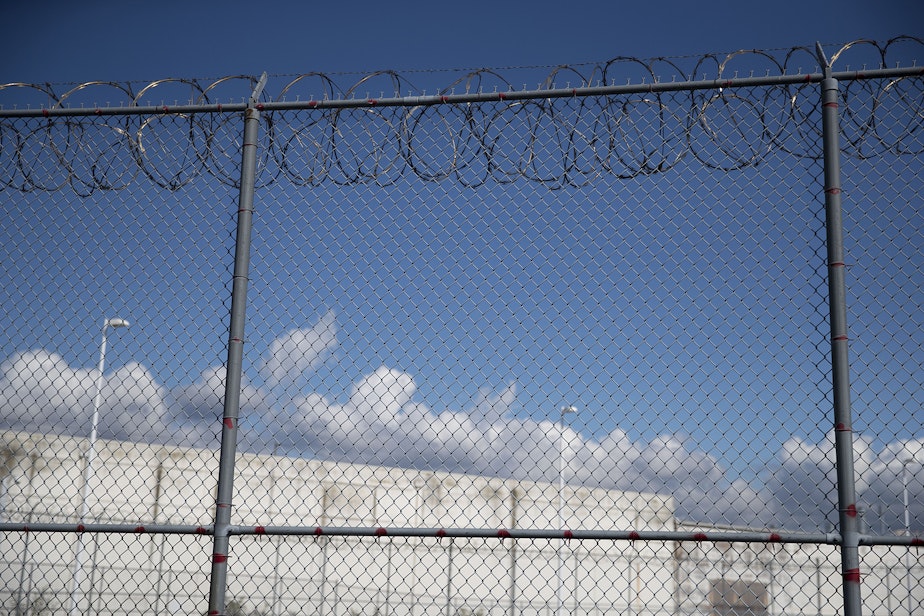UW report finds claims of sexual abuse at the NW Detention Center are not being investigated

There are more disturbing stories out of the Northwest Detention Center in Tacoma, run by the private security company The GEO Group, about detainees’ complaints of sexual harassment and sexual assault. Immigration detainees are supposed to be protected while in custody, but a new report suggests the system is not adequately keeping detainees safe, or capturing the true scope of alleged abuses.
KUOW’s Kim Malcolm interviewed professor Angelina Godoy about the abuse findings. Godoy directs the University of Washington Center for Human Rights, which authored the study.
This interview has been edited for clarity.
Kim Malcolm: Your report states that concerns about sexual abuse are common in immigration detention. What were you and your researchers really trying to determine when you started this investigation?
Professor Angelina Godoy: While concerns are common, the standards governing the handling of reported sexual abuse and assault within facilities are rigorous. We set out to try to understand how those standards were being upheld in actual practice at the Northwest Detention Center in Tacoma.
When detainees want to report an allegation what do they do, and how effective is it?
There's a whole proliferation of rules governing how detainees can report abuse and what responses should be given when they report through these various channels. Theoretically, they can speak to GEO Group personnel right at the facility, they can speak to ICE, and they can report through written or verbal grievances. There are hotlines that ICE maintains at a national level that they can call. There are posters around the facilities to inform them about those hotlines.
Sponsored
Unfortunately, what our research uncovered was that oftentimes when abuses are reported through those mechanisms, it appears there's no adequate follow-up, at least judging by the written record that we were able to review.
Can you give us an example of a case that stands out for you?
Perhaps the ones that stood out to me the most were these hotlines. Literally, we found that in a majority of cases where the people operating the hotline documented calls from either people within the facility reporting abuse or somebody calling on behalf of someone in the facility reporting abuse, there was no apparent response from ICE, no written documentation of a response.
What this suggests is a lot of energy is paid to whether these posters are up on the walls, but the hotlines are literally calls to nowhere, where people call and report an abuse and nothing changes. There's not even an investigation, apparently, into what happened, let alone any efforts taken to prevent it from happening again.
Your report also points out that there are gaps with the reporting into a database for cases. What does that tell you about the scope of the problems?
Sponsored
One of the most worrisome concerns we have is it really suggests that nobody actually knows how many assaults are being reported at the facility, let alone how many may actually be happening. There's really no reason, based on the rigorous research we did, to believe that anyone is actually monitoring this closely.
This points to oversight. That would fall to Congress. What are you hearing from members of Congress on this issue?
Unfortunately, I think oversight of ICE and DHS operations, in general, is pathetic. There are many, many different branches of Congress that are mandated to carry out these actions, but there's very little happening. We know that abuses are happening in all of these facilities on a regular basis. Some of these abuses result in actual lethality, and still, nothing changes.
I think it's easy to beat up GEO for their hand in this. ICE is also responsible, but so too is our Congress for allowing these abuses to persist. In 2020, as part of the appropriations process, Congress did mandate a whole other oversight layer be placed upon existing oversight layers, which already fail.
What we need is not more layers upon layers, when we know that these layers simply don't work. We need a recognition that this system is fundamentally broken. There's no need to hold people in detention in this way. They're not a public safety threat. We, therefore, need to get rid of this system and do something instead that prioritizes people's safety and well-being in communities while they resolve their immigration matters.
Sponsored
Listen to the interview by clicking the play button above.





